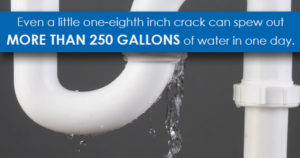How to Prevent Frozen Pipes This Winter
We’ve all been there: we wake up one frigid morning, turn on the faucets in our bathroom sinks, and find that only a trickle of water comes out. Plumbing 101 tells us that frozen pipes are probably the culprit.
Frozen pipes — or even burst pipes — in the dead of winter can range from inconvenient to downright dangerous. You should always call a professional when you have serious plumbing problems, but it’s important to do everything you can to prevent these issues from occurring in the first place. If you want to avoid that hassle this season, there are some things you can do to help prevent your pipes from freezing in the winter.
Check outside
Before the first frost hits, you need to do your due diligence outside your house. That means that you need to remove, drain, and store your garden hoses. You also need to drain the water from your pool and sprinkler hook-ups. Do not use antifreeze unless directed to do so.
Review unheated areas
Areas in your home that have unheated water supply lines are particularly vulnerable to problems. These areas include basements, attics, garages, crawl spaces, and underneath cabinetry. Make sure that all pipes in these areas have proper insulation. And if you notice any leaking pipes, get them fixed right away.
Consider insulation
 When temperatures drop below 20 degrees Fahrenheit, non-insulated water pipes are likely to freeze and break. In fact, even a little one-eighth inch crack can spew out more than 250 gallons of water in one day. That’s a lot of damage for something so small! That’s why you should insulate water pipes with products like pipe sleeves or use heat tape on exposed pipes. We can give you recommendations for the right type of insulation product for your pipes.
When temperatures drop below 20 degrees Fahrenheit, non-insulated water pipes are likely to freeze and break. In fact, even a little one-eighth inch crack can spew out more than 250 gallons of water in one day. That’s a lot of damage for something so small! That’s why you should insulate water pipes with products like pipe sleeves or use heat tape on exposed pipes. We can give you recommendations for the right type of insulation product for your pipes.
Set the thermostat
For many families trying to save some money on their heating bill, it may be tempting to set the thermostat lower while everyone’s asleep. But doing that can really increase your chances of waking up to frozen pipes. Although you may not like getting a slightly higher energy bill, keeping your thermostat at a consistent temperature is much better for your plumbing. Frankly, the money you’d save on lowering your heat at night will be a lot less than what you’d pay to fix a burst pipe.
Fix issues now
If you notice any issues with your plumbing whatsoever — a leaking faucet, water heater installation and repairs, or other corrosion problems — you should get them fixed right away. Don’t put them off until too much damage is already done. And if you have any plumbing questions, call a professional.
Whether your plumbing system needs extensive repairs or you simply have a clogged drain, we’re here to help. If you’re looking for the best plumbers Bergen County NJ has to offer, give us a call today.
